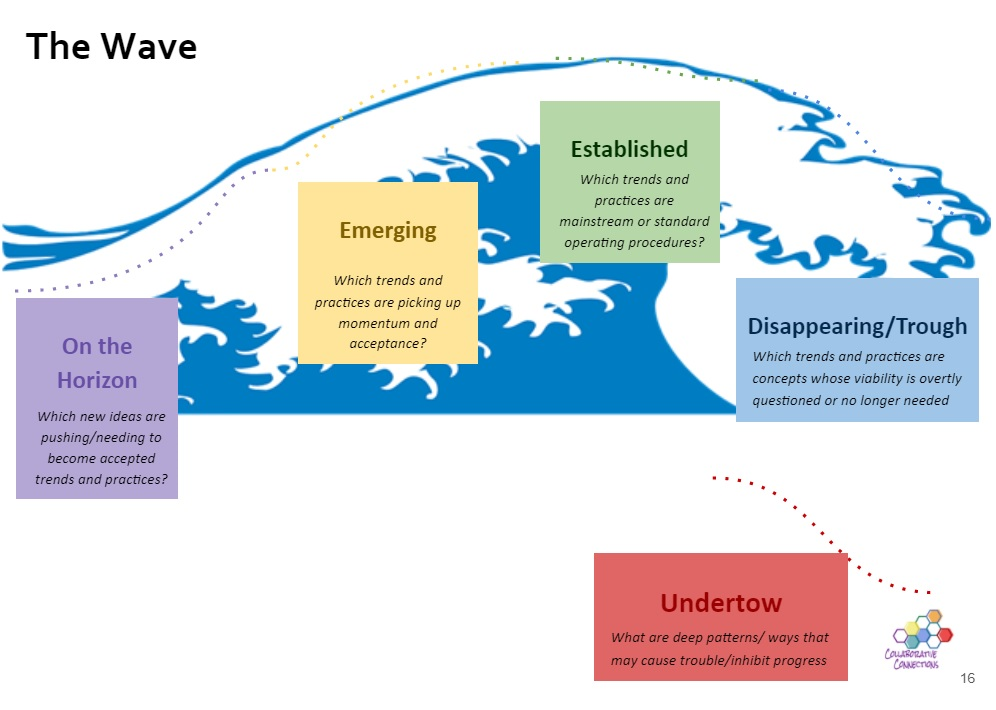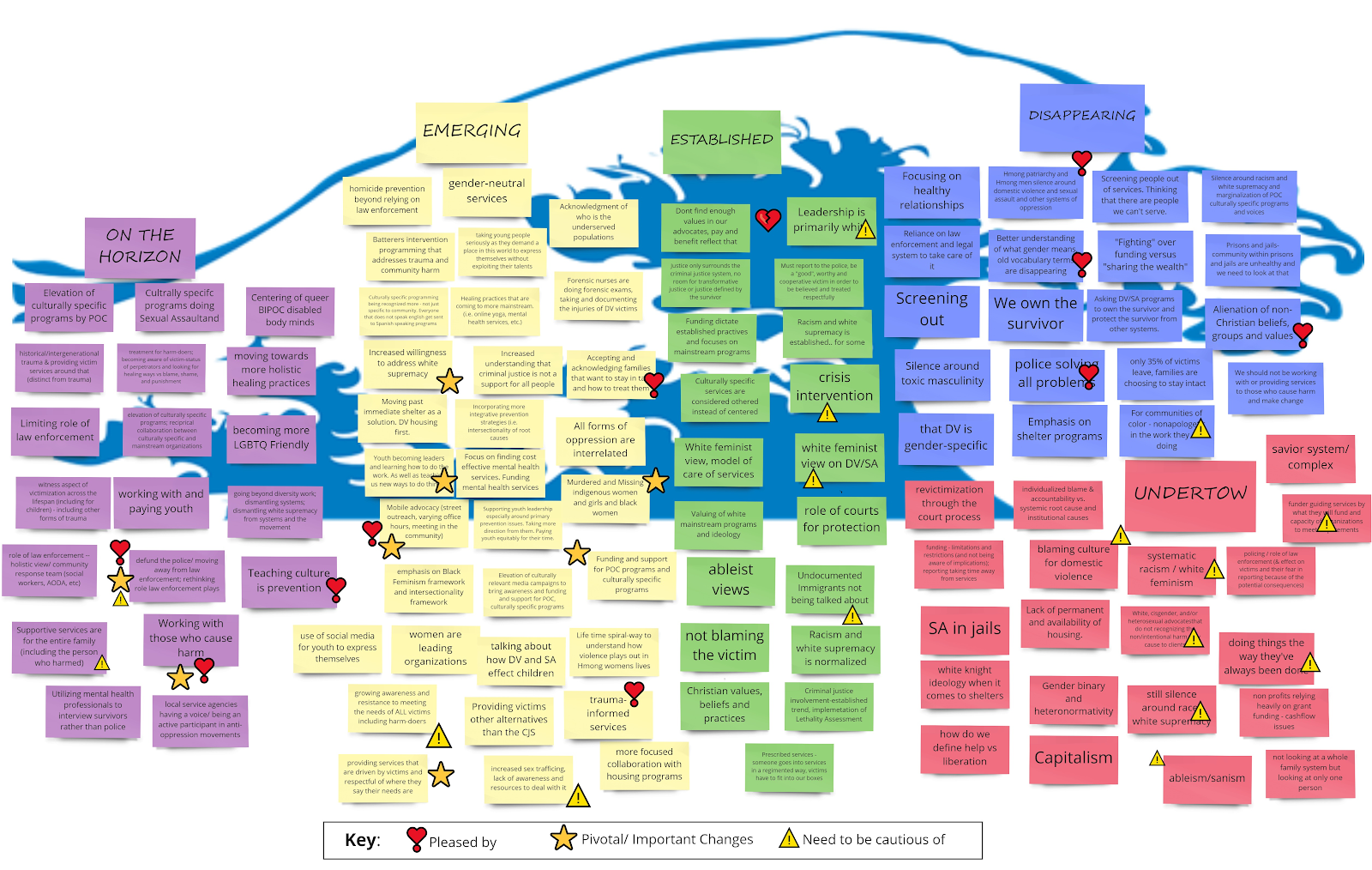Service Providers’ Input and Ideas
The Long Range Plan Team held input sessions over several months with directors and advocates from member programs throughout the state. This information is included below not only to honor the work of those who provided that feedback, but also to serve as a foundation for the interpretations and recommendations laid out later in the plan. We have included quotes from domestic violence (DV) & sexual assault (SA) advocates who were part of this input-gathering process, offering reflection from essential participants in the formation of this Long Range Plan (LRP).During an initial session, advocates were asked to map their responses to this question onto a wave:
“What are the changes, trends, paradigms, and approaches emerging in the field of domestic violence and sexual assault?”
Their responses are show below.
On the Horizon:
“Which new ideas are pushing/needing to become accepted trends and practices?”
- Elevation of culturally specific programs led by BIPOC and LGBTQ2S+ folks
- Culturally specific programs doing SA work
- Supportive services for harm-doers and the entire family unit when appropriate
- Rethinking the role of law enforcement
- Working with and paying youth
- Teaching culture and primary prevention efforts
Emerging:
“Which trends and practices are picking up momentum and acceptance?”
- Gender inclusive services
- Increased willingness to address white supremacy
- Youth becoming leaders and learning how to do the work
- Mobile advocacy, street outreach, and varying office hours
- Funding support for BIPOC and culturally specific programs
- Providing survivors other alternatives than the criminal legal system
Established:
“Which trends and practices are mainstream or standard operating procedures?
- Pay and benefits for advocates is not equitable
- Funding streams dictate the focus of programming needs
- The leadership in DV-SA programs is primarily white
- Almost all of funding is only for direct services and crisis intervention rather than prevention
Disappearing / Trough:
“Which trends and practices are concepts whose viability is no longer needed?
- Law enforcement solving all the problems
- Oppressive and harmful vocabulary and terms
- The belief that victims always leave
- Screening people out of services; thinking that there are some people we cannot serve
Undertow:
“What are the deep patterns/ways that may cause trouble/inhibit progress?
- Housing instability and economic insecurity
- Systemic racism and white supremacy
- Non-profits rely heavily on rigid and restrictive government funding
- Over-reliance on the criminal legal system
Implications and opportunities noticed during initial session:
- We need to go beyond emergency shelters and crisis intervention
- Believe in the inherent goodness in people and their potential to evolve when given the right resources and networks of support
- Invest in youth leadership as a prevention strategy
In a later session, advocates were asked to respond to the question:
“What innovative approaches would create a Wisconsin that centers the strength of survivors and supports their liberation?”
Their responses are assembled to the right and below.
1. Wisconsin will design the system according to survivor-identified needs
Ideas generated
- Abolish agency policies that make survivors go through barriers to receiving services
- Increase digital/virtual/mobile advocacy services and other innovative pathways to accessible services
- Integrate and provide funding supports for more holistic approaches to healing, like art and culture
- Recognize the need for dual DV/SA funding supports
- Get feedback from survivors about the experience of the safety and economic security during the Covid-19 pandemic
- Promote the education and transformation of mainstream programs to expand the variety of responses that are available to survivors and to become programs that support the cultures and values of culturally specific programs
2. Wisconsin will elevate survivor leadership through community generated policies and practices
Ideas generated
- Increase funding for survivors to take on leadership roles, including intentional mentorship programs and mentoring
- Hold mainstream DV/SA programs financially and contractually accountable for discrimination against employees and survivors
- Remove barriers to DV/SA funding to make it accessible to all
- Focus on funding to support the services of culturally specific programs
- Create a statewide DV/SA survivor advisory council tasked with providing feedback to state agencies, the Governor, and other entities
- Pay survivors for their time
- Create funding frameworks and opportunities based on the input and feedback from individuals that programs cannot/do not serve
3. Wisconsin will dismantle and re-create systems through intersectional, radical transformation
Ideas generated
- Ensure evaluation frameworks, supportive systems, and funding strategies support anti-oppression practices and strategies
- Support policy change and budget reallocation to provide more funding in the state budget for community-based, culturally-specific programs that provide support to both DV and SA survivors
- Support the leadership of BIPOC and LGBTQ2S+ survivors and advocates through targeted funding and support
- Adopt housing first philosophy
4. Wisconsin will grow innovative, linguistically and culturally-responsive collaborations and reckon with engagement with law enforcement and other power systems
Ideas generated
- Re-imagine multi-disciplinary teams to be non-carceral
- Require programs to have materials translated to Spanish and Hmong languages and other languages by trusted, accredited, cultural translators
- Recognize the expertise of and provide resources for programs to access and compensate local community leaders who can help the most while doing the least harm – village Chiefs, Clan Mothers, midwives, grandmas, and aunties.
- Build training pathways, partnerships and paid apprenticeships for community members to build leadership and skills
- Support and incentivize paid training apprenticeships in advocacy programs for BIPOC and LGBTQ2S+ survivors to build leadership and skills
- Fund BIPOC and LGBTQ2S+ advocates to lead and direct efforts
5. Wisconsin will provide equitable substantial, meaningful, non-restricted, flexible funding for services, prevention, and for BIPOC
Ideas generated
- Fill in the gaps in SANE services. Ensure that a sufficient and diverse population of SANE nurses are available to limit travel for forensic exams
- Provide equitable funding for DV and SA, demonstrated by an initial increase in funding for SA programs
- Increase funding for primary prevention initiatives
- Match requirements for funding are either eliminated or waivable
- More equitable funding for BIPOC and culturally specific programs
- Provide funding and resources for increased compensation to DV/SA advocates
- Provide funding to allow programs to pay a wage differential to bi-lingual advocates for their bi-lingual, bi-cultural skills
6. Wisconsin will move beyond the binary of victims/abusers to address the root causes and end violence
Ideas generated
- Work with victims and advocates to determine alternative to mandatory arrest policies
- Recognize the saliency of basic human needs in victims’ lives and communities and develop and implement policies that address those needs
- Create new funding streams for programs that work with those who cause harm
- Fund and support responses to DV and SA that focus on healing and primary prevention
- Fund and support restorative justice and other community response systems that are outside the criminal legal system
- Focus on and expand the housing first model
- Support the universal basic income model
- Raise the minimum wage
- Expand Medicaid and provide universal health care
Quotes from domestic violence & sexual assault advocates
Offering reflection from these essential participants.“For me, the key insight is that we address the […] whole family and community with all of our healing awareness; unconditional acceptance of each person fully, bringing community to [an] understanding of root causes of violence, and healing paths to wholeness.”
“…moving past immediate shelter as a solution, housing first. We have to address housing, basic resources, logistical/economic factors and how they’re impacting victims. Resources should allow them to thrive, which means we have to acknowledge the systems that are negatively impacting the victims.”
“…as a non-binary person, I still find the language very much gendered. I’m often misgendered in rooms, and conversations. This work is not always a safe space for trans and gender-non-conforming individuals. I think the work starts in leadership.”
“Increasing sexual assault funding is crucial to serve BIPOC and all cultural communities in Wisconsin. We need a better understanding of the sexual assault dynamics in the field and across the board.”
“Our basic question is how to increase services (and provide the most needed services) for the most marginalized.”
“We need training for agencies and advocates around indigenous tribal laws and codes that affect survivors. These trainings should be Indigenous women/girls/2spirit survivor-led”



